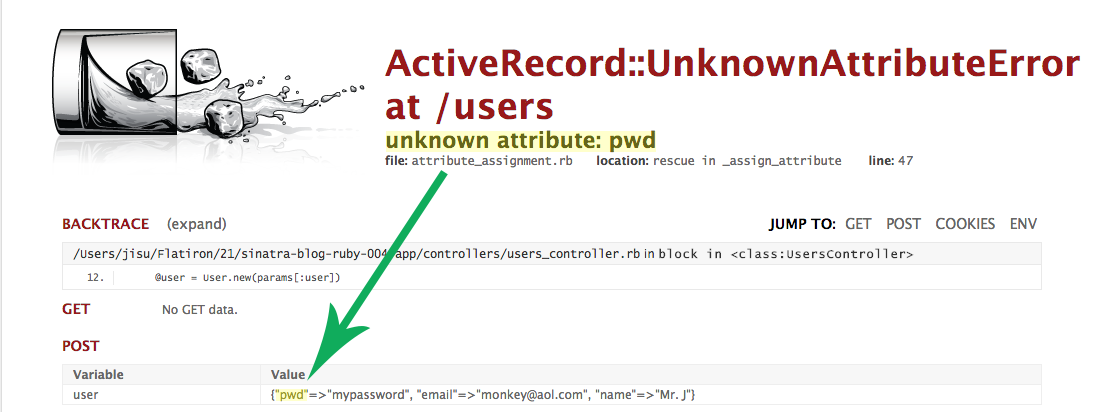Considering there isn’t much information on params I wanted to write a blog post on it. However during the past week at the Flatiron School, we were forwarded two informative blog posts on params. You can check them out here:
http://codefol.io/posts/How-Does-Rack-Parse-Query-Params-With-parse-nested-query
Rather than reinvent the wheel I decided to add to the material mentioned in the blog posts above. One of the key points we learned during lecture was to use proper naming conventions so that we could do a mass assignment with params. For example:
1 2 3 4 5 6 7 8 9 10 11 12 13 14 15 16 17 18 19 20 21 22 23 | |
Using mass assignment, lines 10-12 above can be replaced with @user=User.new(params[:user]) resulting in the following.
1 2 3 4 5 6 7 8 9 10 11 12 13 14 15 16 17 18 19 20 | |
There are only three attributes(name, email, password) but as attributes are added one can quickly see how mass assignment will be useful.
Using the same example, the trick to utilizing mass assignment is to get params to return a hash with the following structure:
1 2 3 4 5 6 7 | |
To get params to have that type of structure, one needs to properly name the form inputs for the name attribute.
1 2 3 4 5 6 7 8 9 10 11 12 13 14 15 | |
Notice within the <input> controls: name="user[name]", name="user[email]", name="user[password]". Using this naming convention we are able to get back the desired params hash because both user and [attribute] are keys to the input value.
Also because our naming convention will return a hash – the order of which the form labels are arranged does not affect the mass assignment. However, the last key value must be identical to the column name of the attribute assigned.
Based on the naming convention above our migration table should look like below
(Note: I mixed up the order of the columns to show that order doesn’t matter but the column names must match the last key of the params hash)
1 2 3 4 5 6 7 8 9 10 | |
Column names must match the last key of the params hash for mass assignment.
Line 6
:namematches the last key of thename=attribute<input type="text" name="user[name]"/>Line 5
:emailmatches the last key of thename=attribute<input type="text" name="user[email]"/>Line 4
:passwordmatches the last key of thename=attribute<input type="text" name="user[password]"/>
If I named the attribute pwd <input type="text" name="user[pwd]"> while the table column is named :password I would get the following error:

Therefore the column names from the migration table must match the last key of the params hash.